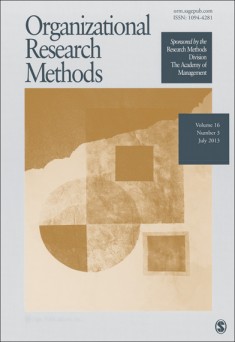The Benefits of Establishing Causal Order in Longitudinal Studies
 [We are pleased to welcome Gerhard Kling of University of London. Gerhard recently published an article in Organizational Research Methods, entitled “Establishing Causal Order in Longitudinal Studies Combining Binary and Continuous Dependent Variables” with co-authors Charles Harvey of Newcastle University Business School and Mairi Maclean of Newcastle University Business School.]
[We are pleased to welcome Gerhard Kling of University of London. Gerhard recently published an article in Organizational Research Methods, entitled “Establishing Causal Order in Longitudinal Studies Combining Binary and Continuous Dependent Variables” with co-authors Charles Harvey of Newcastle University Business School and Mairi Maclean of Newcastle University Business School.]
- What inspired you to be interested in this topic?
We always wonder what comes first, a change in management practice or performance. Are successful companies successful because they were successful in the past? Or did changes in management cause their success?
- Were there findings that were surprising to you?
Initially, we did not intend to develop a new method, the QSP-VAR (qualitative short panel vector autoregression). The reviewers pushed us into this direction, which led to the development of the QSP-VAR. The surprising fact is that our method can be applied in any area of research where there are binary and continuous dependent variables (e.g. genetics).
- How do you see this study influencing future research and/or practice?
As we provide our code (OpenBugs), we hope that other researchers can use the QSP-VAR in their research. We believe that there is a lot of potential in areas where causal order between variables is unknown.
The abstract:
Longitudinal studies with a mix of binary outcomes and continuous variables are common in organizational research. Selecting the dependent variable is often difficult due to conflicting theories and contradictory empirical studies. In addition, organizational researchers are confronted with methodological challenges posed by latent variables relating to observed binary outcomes and within-subject correlation. We draw on Dueker’s qualitative vector autoregression (QVAR) and Lunn, Osorio, and Whittaker’s multivariate probit model to develop a solution to these problems in the form of a qualitative short panel vector autoregression (QSP-VAR). The QSP-VAR combines binary and continuous variables into a single vector of dependent variables, making every variable endogenous a priori. The QSP-VAR identifies causal order, reveals within-subject correlation, and accounts for latent variables. Using a Bayesian approach, the QSP-VAR provides reliable inference for short time dimension longitudinal research. This is demonstrated through analysis of the durability of elite corporate agents, social networks, and firm performance in France. We provide our OpenBUGS code to enable implementation of the QSP-VAR by other researchers.
You can read “Establishing Causal Order in Longitudinal Studies Combining Binary and Continuous Dependent Variables” from Organizational Research Methods for free by clicking here. Want to know all about the latest research from Organizational Research Methods? Click here to sign up for e-alerts!
*Numbers picture credited to morebyless (CC)
 Gerhard Kling is professor of international business and management at SOAS University of London. He studied economics and mathematics and holds a PhD in economics from the University of Tuebingen. His research focuses on quantitative research methods with applications in management and finance. His recent publications are in Organization Studies, the British Journal of Management, and the International Journal of Research in Marketing.
Gerhard Kling is professor of international business and management at SOAS University of London. He studied economics and mathematics and holds a PhD in economics from the University of Tuebingen. His research focuses on quantitative research methods with applications in management and finance. His recent publications are in Organization Studies, the British Journal of Management, and the International Journal of Research in Marketing.
Charles Harvey is professor of business history and management at Newcastle University Business School. He holds a PhD in international business from the University of Bristol. He is author of numerous books and articles in the fields of strategy, leadership, and management. His research focuses on the historical processes that inform contemporary business practice, entrepreneurial philanthropy, and the exercise of power by elite groups in society. His recent publications are in the Academy of Management Review, Organization Studies, Organization, Human Relations, and the Business History Review.
Mairi Maclean is professor of international management and organization studies at Newcastle University Business School, where she is director of research. She received her PhD from the University of St Andrews. Her research interests include international business elites and elite power, entrepreneurial philanthropy, and history and organization studies. She is the author of four books, including Business Elites and Corporate Governance in France and the UK (Palgrave Macmillan, 2006) with Charles Harvey and Jon Press, and editor of a further four. Recent publications include contributions to the Academy of Management Review, Organization Studies, Human Relations, Organization, and the Business History Review.
































































































